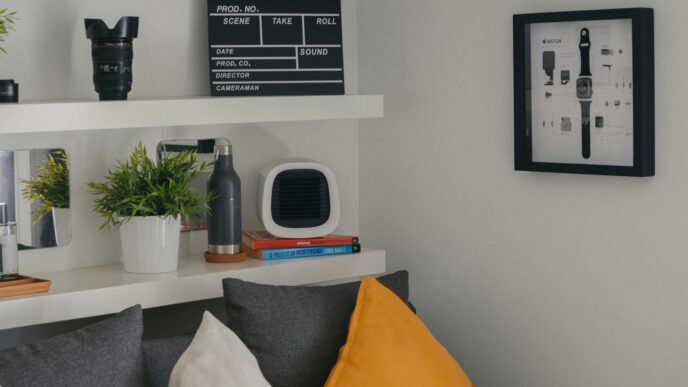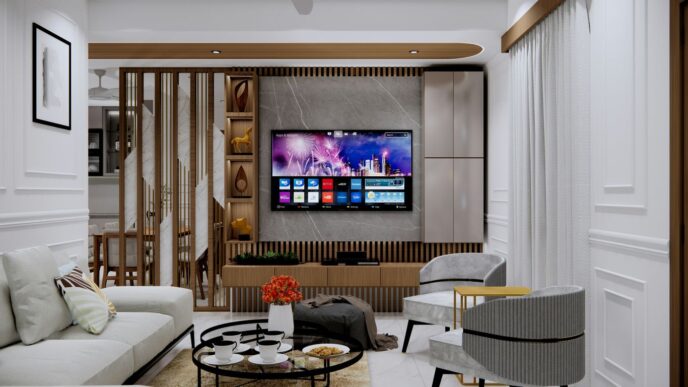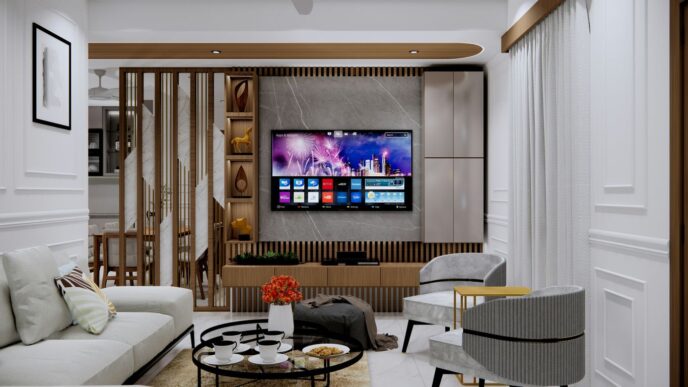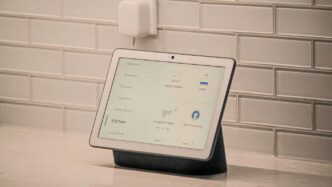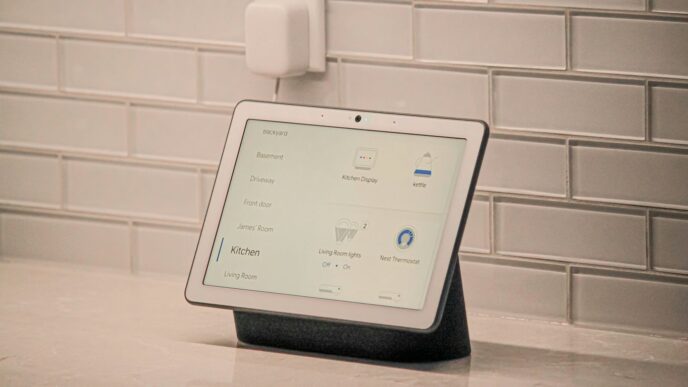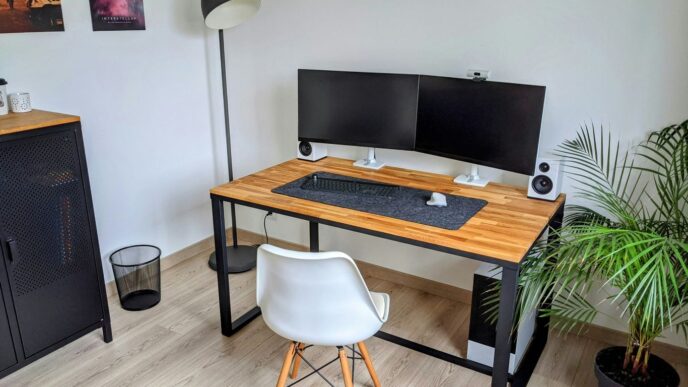Thinking about a job as a home automation specialist? It’s a pretty cool area right now. Smart homes are everywhere, and someone’s gotta make them work. This article will walk you through what it takes to get into this field, from what you need to know to how to get certified.
Key Takeaways
- The smart home world is growing fast, so there are more and more jobs for a home automation specialist.
- You’ll want to get good at things like coding and understanding how networks work if you want to be a home automation specialist.
- Getting certified by groups like CEDIA or Control4 can really help you stand out as a home automation specialist.
- Learning new stuff all the time, especially hands-on practice, is super important for a home automation specialist.
- There are lots of different jobs out there for a home automation specialist, from helping people pick out systems to fixing problems.
The Growing Demand for a Home Automation Specialist
The Rise of Smart Home Automation
Smart homes are really taking off, changing how we live. Think about it: voice commands for lights, thermostats that learn your habits, security systems you can check from your phone. All this stuff is becoming pretty standard. As more and more people want their homes to be connected and smart, the need for folks who know how to make that happen is just exploding. It’s not just about fancy gadgets anymore; it’s about making daily life easier and more efficient. This whole smart home thing isn’t slowing down, so the demand for people who can set it all up is only going to get bigger.
The Expanding Job Market
So, with all these smart homes popping up, guess what? There are tons of new jobs. Companies in tech, security, and even regular home improvement are looking for people who understand how to design, install, and keep these systems running. It’s not just one type of job either. You could be a consultant, helping people figure out what they need, or a system integrator, making sure all the different parts talk to each other. There are also roles for software developers who build the apps that control everything, and technical support specialists who help when things go wrong. The Home Automation System Market is growing fast, so there are plenty of opportunities out there.
The Need for Specialized Training
While the job market looks great, you can’t just jump in without knowing your stuff. This isn’t like fixing a leaky faucet; smart home systems are complex. They involve a mix of hardware and software, so you need to understand electronics, networking, and even some programming. Getting the right training is super important. It’s what separates someone who can tinker with a smart speaker from someone who can design and implement a whole-house automation system. Without specialized training, you’d be pretty lost trying to keep up with all the new tech coming out.
Essential Skills for a Home Automation Specialist
Becoming a home automation specialist means you’ve got to have a pretty specific set of skills. It’s not just about liking gadgets; it’s about knowing how they tick, how they talk to each other, and what to do when they don’t. Think of it like being a conductor for a really complex orchestra, but instead of instruments, you’re dealing with smart lights, thermostats, and security cameras.
Programming and Coding Proficiency
So, first up, you’re going to need to get cozy with programming and coding. It’s not always about building a whole new app from scratch, but often it’s about customizing existing systems or making different devices play nice together. Knowing languages like Python, JavaScript, or even C++ can really set you apart. These aren’t just for software developers anymore; they’re tools for making smart homes truly smart. You might be writing scripts to automate routines, like having your blinds close when the sun hits a certain angle, or making sure your coffee machine starts brewing when your alarm goes off. It’s all about making the tech do exactly what the homeowner wants, and that often means getting into the code.
Networking Fundamentals
Next, you absolutely have to understand networking. Seriously, this is huge. Every smart device in a home is connected to a network, whether it’s Wi-Fi, Ethernet, or something else entirely. If you can’t figure out why a device isn’t connecting, or why the internet is slow, you’re going to hit a wall pretty fast. You’ll be dealing with things like:
- Setting up routers and access points
- Managing IP addresses and subnet masks
- Troubleshooting connectivity issues
- Understanding network security protocols
It’s all about making sure the digital highways in a home are clear and fast for all the smart traffic. Without a solid network, even the coolest smart gadgets are just expensive paperweights. For those looking to boost their career, IT certifications can be a great way to show off your networking chops.
System Integration Expertise
This is where it all comes together. System integration is about making sure all the different smart devices and platforms in a home work as one cohesive unit. You’re not just installing a smart thermostat; you’re making sure it talks to the smart lighting, the security system, and maybe even the entertainment system. It’s like putting together a giant puzzle where all the pieces come from different manufacturers. You’ll need to know about:
| Integration Type | Description |
|---|---|
| Device-to-Device | Direct communication between two smart devices. |
| Platform-to-Platform | Connecting different smart home ecosystems (e.g., Google Home with Apple HomeKit). |
| Custom Automation | Creating unique routines and scenes that involve multiple devices. |
This skill is what turns a collection of smart gadgets into a truly automated home. It’s about creating a seamless experience for the homeowner, where everything just works, often without them even thinking about it.
Troubleshooting and Problem-Solving
Finally, and maybe most importantly, you need to be a top-notch troubleshooter. Things will go wrong. A device won’t connect, a routine won’t trigger, or something will just stop working for no apparent reason. When that happens, you’re the one who has to figure it out. This isn’t just about following a checklist; it’s about critical thinking and being able to diagnose problems that might not have obvious solutions. You’ll need to:
- Identify the root cause of the problem.
- Isolate the faulty component or software.
- Implement a solution, which might involve reconfiguring, updating, or replacing.
- Test the system to ensure the fix worked and didn’t create new issues.
Being able to calmly and effectively solve problems is what keeps clients happy and systems running smoothly. It’s the difference between a minor hiccup and a full-blown smart home meltdown.
Recognized Certifications for a Home Automation Specialist
Getting certified is a big deal if you want to make a name for yourself in home automation. It shows you know your stuff and can really help you stand out from the crowd. Think of it like a stamp of approval that tells potential clients and employers you’re serious and capable. There are a few key certifications that really matter in this field, and getting one (or more!) can open up a lot of doors.
CEDIA Certified Professional
CEDIA, which stands for the Custom Electronic Design & Installation Association, is a huge name in the smart home world. They offer certifications like the CEDIA Electronic Systems Certified (ESC) Technician and Designer. These certifications are highly respected and show you’re good at designing and installing smart home systems. If you’re looking to prove your skills across different brands and systems, a CEDIA certification is a solid choice. It’s like a universal badge of honor in the industry. For example, if you’re doing appliance installation services in Sydney, having a CEDIA certification can give clients extra confidence.
Control4 Certified Expert
Control4 is a major player in home automation, known for its integrated solutions. Becoming a Control4 Certified Expert means you’ve got the skills to install, set up, and keep their systems running smoothly. This certification is super valuable if you plan on working a lot with Control4 products, which are pretty common in many smart homes. It shows you’re not just generally good at automation, but you’re specifically proficient with one of the leading platforms. It’s a specialized skill that can really pay off.
Crestron Certified Programmer
Crestron is another big name, especially in more complex and high-end automation projects. Their certifications, like the Crestron Certified Programmer and Crestron Certified Technician, prove you can design and implement Crestron solutions. These certifications are widely recognized and sought after by companies that deal with advanced automation systems. If you’re aiming for roles that involve custom programming and intricate system designs, getting a Crestron certification is definitely something to consider. It tells everyone you’re ready for the big leagues.
Key Training Areas for a Home Automation Specialist

Becoming a home automation specialist means you’ll need to get some specific training. It’s not just about knowing a little bit about smart gadgets; it’s about really understanding how everything works together. You’ll want to focus on a few key areas to make sure you’re ready for the job.
Technical Expertise Development
First off, you’ve got to get your technical skills in order. Smart home systems are a mix of hardware and software, so you need to know about both. This means getting a good handle on electronics, how networks operate, and even some programming. Think about it: you’ll be dealing with everything from tiny sensors to complex control panels. Training programs usually give you a solid education in all these technical parts of smart home tech. It’s about building a strong foundation in how these systems are put together and how they function.
Industry-Specific Knowledge Acquisition
Next up is learning about the industry itself. The smart home world is huge, with tons of different devices and technologies out there. Your training shouldn’t just cover the basics; it should also get into the specific stuff that’s happening in the industry. This includes keeping up with the newest trends, what new technologies are coming out, and any compatibility issues you might run into when you’re actually working on a project. It’s like learning the language of smart homes, not just the alphabet. For example, you might learn about:
- Different communication protocols (like Zigbee or Z-Wave)
- Popular smart home platforms (like KinCony IoT or others)
- Common device types (lighting, security, climate control)
- Industry standards and best practices
Hands-On Practical Experience
Finally, and this is a big one, you need to get some hands-on experience. Reading about it is one thing, but actually doing it is totally different. A lot of good training programs will give you chances to do practical exercises, simulations, and even real-world projects. This lets you use what you’ve learned in a controlled setting. This kind of practical experience is super important when you’re moving from training into a professional career. You’ll get to:
- Install and configure smart devices.
- Troubleshoot common system issues.
- Design and implement custom automation routines.
- Work with various smart home software interfaces.
- Practice client communication and project management.
Evolving Landscape for a Home Automation Specialist
The world of home automation is always changing, and if you want to stick around in this field, you’ve got to keep up. It’s not enough to just know what’s out there today; you need to have an idea of what’s coming next. Things move fast, and what was cutting-edge yesterday might be old news tomorrow. Staying current means constantly learning and adapting, which is pretty much the name of the game in this industry.
Artificial Intelligence and Machine Learning Integration
AI and machine learning (ML) are really shaking things up in smart homes. We’re talking about systems that don’t just follow commands but actually learn from how people live. Imagine a house that figures out your routine and adjusts the lights or temperature before you even think about it. That’s where AI comes in. For anyone working in home automation, understanding how to use these technologies is becoming super important. It’s about making homes smarter, not just automated. Professionals who can integrate AI and ML will be able to create truly adaptive and personalized home environments. This means knowing how to set up systems that can collect data, analyze it, and then make decisions based on what they’ve learned. It’s a whole new level of convenience and efficiency.
Cybersecurity Best Practices
With more and more devices connected in our homes, cybersecurity is a huge deal. Every smart device, from your doorbell to your thermostat, is a potential entry point for someone trying to get into your network. That’s why anyone working with home automation needs to be really good at protecting these systems. It’s not just about keeping data safe; it’s about keeping people’s homes secure. Think about it: if someone hacks into a smart home, they could mess with security cameras or even door locks. So, knowing how to set up secure networks, use strong passwords, and keep software updated is non-negotiable. It’s all about making sure the smart home is a safe home. For example, a good professional will:
- Set up separate guest networks for smart devices.
- Regularly update firmware on all connected devices.
- Educate homeowners on common phishing scams.
- Implement multi-factor authentication wherever possible.
- Use strong, unique passwords for every device and service.
Sustainable and Energy-Efficient Solutions
Everyone’s talking about going green, and smart homes are a big part of that. People want homes that save energy and are good for the planet. This means home automation specialists need to know about things like smart thermostats that learn your habits to save energy, or lighting systems that adjust based on natural light. It’s not just about convenience anymore; it’s about making homes more efficient and reducing their environmental footprint. Knowing about solar integration, smart energy management systems, and even water conservation technologies is becoming a must. It’s a way to make homes not just smart, but also responsible. For instance, a professional commercial electrician might work with home automation specialists to ensure energy-efficient systems are installed correctly and safely. This focus on sustainability is only going to grow, so being on top of these solutions is a smart move for any home automation career.
Career Opportunities for a Home Automation Specialist
So, you’ve got the skills, maybe even a certification or two. What’s next? The home automation field is really taking off, and there are a bunch of different paths you can go down. It’s not just about installing gadgets anymore; it’s about making homes smarter and more connected. This means there are plenty of roles for people who understand how all these smart devices talk to each other.
Smart Home Consultant
If you like working with people and figuring out what they really need, being a smart home consultant might be for you. You’d be the person who sits down with clients, listens to their ideas for a smart home, and then designs a system that fits their lifestyle and budget. It’s a lot about communication and translating tech talk into something everyone can understand. You’re basically the architect of their connected living space. You’ll need to know a lot about different brands and systems to recommend the best fit.
System Integrator Roles
This is where the rubber meets the road, so to speak. As a system integrator, you’re the one who actually makes all the different smart home components work together. Think about it: a smart thermostat, lighting system, security cameras, and entertainment setup all need to communicate seamlessly. It’s like being a conductor for an orchestra of devices. You’ll be doing things like:
- Connecting various devices to a central hub.
- Writing custom scripts to automate routines.
- Making sure everything is secure and reliable.
It’s a hands-on job that requires a good grasp of networking and programming.
Software Developer in Automation
For those who love to code, there’s a big demand for software developers in home automation. You could be building the apps that control smart devices, creating new features for existing systems, or even developing the underlying software that powers the whole smart home ecosystem. This role often involves:
- Designing user interfaces for smart home control.
- Developing APIs for device communication.
- Working on cloud-based platforms for remote access.
It’s a creative role where you can really shape how people interact with their smart homes. The latest technological advancements in this area are always creating new possibilities.
Technical Support Specialist
Even the smartest homes can have their quirks. That’s where technical support specialists come in. You’re the problem-solver, the person who helps users when their smart lights won’t turn off or their voice assistant isn’t listening. It’s a crucial role because a good support experience can make all the difference for a user. You’ll be:
- Troubleshooting connectivity issues.
- Guiding users through setup processes.
- Diagnosing software glitches.
It requires patience, good communication skills, and a solid understanding of how smart home systems operate.
Ready to Start Your Smart Home Career?
So, becoming a certified home automation specialist is a pretty smart move right now. The industry is just getting bigger, and people want more tech in their homes. Getting certified shows you know your stuff, which can really help you get a good job. It’s not just about knowing how to hook things up; it’s also about keeping up with new tech and making sure everything works well for people. If you’re thinking about this path, getting the right training and certifications is a big step. It sets you up for a good career in a field that’s only going to keep growing.
Frequently Asked Questions
Why is it important to get certified in home automation?
Getting certified shows you really know your stuff and helps you stand out to employers. It proves you’re serious about this job and ready to tackle tough tasks.
What skills do I need to become a home automation specialist?
You’ll need to learn programming, like how to make devices do what you want, understand how computer networks work, be good at connecting different systems, and be able to fix problems when things go wrong.
Are there specific certifications I should aim for?
Yes, there are several good ones. Some popular ones include certifications from CEDIA, Control4, and Crestron. These show you’re skilled in specific systems and designs.
How do I start learning about home automation?
You can start by learning about electronics, computer science, or engineering. You can get a college degree, take special classes, or even learn online. The main thing is to get a good grasp of the basics.
What new things are happening in smart home automation?
The field is always changing! You’ll see more smart homes using artificial intelligence to learn your habits, and there’s a big focus on making sure these systems are secure from hackers. Also, smart homes are getting better at saving energy.
What kinds of jobs can I get with home automation skills?
You can work as a smart home helper who advises people, someone who sets up and connects different systems, a computer programmer who creates apps for smart homes, or a tech support person who helps fix issues.






